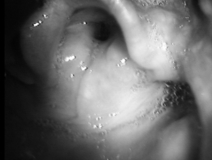The occurrence of a runny nose during pregnancy is far from uncommon. On the one hand, a woman's immunity is weakened, and on the other, rhinitis has many reasons for its occurrence, so it is extremely difficult to protect yourself from snot. A runny nose in pregnant women brings discomfort to both the expectant mother and the fetus, so you should not neglect the treatment.
 A runny nose during pregnancy in the 2nd trimester is often caused by hormonal changes, due to which the nasal mucosa becomes swollen and hypersecretion appears. Sometimes a runny nose during pregnancy begins in the 1st trimester and continues until delivery, which is also associated with hormone levels. In this case, the pregnant woman develops vasomotor rhinitis.
A runny nose during pregnancy in the 2nd trimester is often caused by hormonal changes, due to which the nasal mucosa becomes swollen and hypersecretion appears. Sometimes a runny nose during pregnancy begins in the 1st trimester and continues until delivery, which is also associated with hormone levels. In this case, the pregnant woman develops vasomotor rhinitis.
If rhinorrhea and nasal congestion in a pregnant woman lasts 5-7 days, the cause may be:
- viral pathogens that penetrate the respiratory tract and settle on the nasopharyngeal mucosa. The weakening of local protection leads to damage to the mucous membrane, the appearance of swelling, inflammation and increased mucus secretion. Rhinitis in pregnant women of viral origin is one of the most common pathologies;
- bacterial microorganisms. A bacterial rhinitis during pregnancy can be caused by an intensification of a chronic infection, for example, with sinusitis, or be the result of a secondary infection against the background of a viral disease. Symptomatically, this rhinitis during pregnancy is more severe, with severe fever and headache. Pain sensations can bother in the area of the bridge of the nose, eyebrows and paranasal region;
- hypothermia and colds lead to a weakening of the immune system, local spasm of blood vessels and increased trauma to the nasal mucosa. During early pregnancy, you need to especially carefully monitor your health, dress warmly and avoid contact with sick people;
- curvature of the septum or injury can interfere with nasal breathing, predisposing to mucosal edema and rhinorrhea;
- allergic factors, for example, food, animal dander, pollen, fluff, perfume aromas, household chemicals can cause allergies, even if a woman has never suffered from this before. In this case, rhinitis during pregnancy lasts as long as contact with the allergen lasts. If a woman is allergic to dust mites, symptoms may worsen at night and subside somewhat during the day;
- unfavorable living or working conditions. This applies to dustiness, dry air, mold and chemical pollution of the environment;
- severe somatic diseases that reduce the level of immune defense;
- taking hormonal drugs on the eve of conceiving a child.
Acute rhinitis during pregnancy is often diagnosed in women with a long smoking history.
Clinical signs
Rhinitis of pregnant women goes through several stages:
- reflex, which is characterized by narrowing of the superficial blood vessels and the appearance of dryness of the mucous membrane. Clinically, this period is manifested by burning and itching in the nose;
- catarrhal, when the nose flows strongly during pregnancy, there is hypersecretion and swelling of the mucous membrane. The current stage is characterized by the most pronounced nasal congestion and rhinorrhea. Snot mucous and watery;
- at this stage, a severe runny nose ends, the discharge becomes thicker and becomes yellowish.
Rhinitis of pregnancy is characterized by symptoms from both the upper respiratory tract and the lower. When the disease is observed:
- frequent sneezing;
- nasal congestion, which makes it difficult to sleep, talk, and smell;
- dry crusts in the nose, sometimes with bloody streaks. This indicates damage to the small blood vessels of the mucosa;
- discharge from the nose;
- headache;
- coughing. Laryngopathy often develops with a runny nose in pregnant women, which is also associated with hormonal fluctuations. Cough can occur with an infectious or allergic origin of the disease;
- sore throat;
- fever, the severity of which depends on the cause of the disease.
If snot appears during pregnancy against the background of hormonal changes, in addition to nasal discharge, there are no other symptoms (hyperthermia, cough).
Many people believe that pregnancy and a runny nose can proceed without interfering with each other at all, but this is not the case. Chronic nasal congestion can lead to:
- purulent rhinitis, which is a complication of rhinitis due to the addition of bacterial pathogens;
Long-term inflammation is an excellent ground for secondary infection and tissue hyperplasia.
- hypoxia of the embryo. It is dangerous at any gestational age, whether this is the beginning of pregnancy, the second or third trimester. Insufficient supply of oxygen to the lungs and bloodstream of a woman leads to its deficiency in the fetus. The consequence of this can be malformations, premature birth or pathology of the placenta;
- Difficulty nasal breathing causes the woman to breathe through her mouth. This allows cold, untreated air to enter the respiratory tract, increasing the risk of laryngitis or tracheitis.
How to cure a runny nose?
Immediately, we note that you should not fight the disease on your own, because taking medications has an effect not only on the body of the expectant mother, but also on the embryo. Some drugs are absolutely contraindicated during the period of gestation, others are allowed to be taken only under the supervision of a doctor.
A runny nose at the beginning of pregnancy of non-infectious genesis does not cause problems in treatment, so you can cope with it at home. However, only a doctor can make a differential diagnosis between infectious and non-infectious diseases, therefore his consultation is mandatory.
Rhinitis of pregnant women requires the appointment of several groups of drugs:
- salt solutions. They are allowed even if a runny nose occurs in the early stages of pregnancy. These drugs have no side effects and can be used for a long time. At the pharmacy, you can buy saline, Aqua Maris, Humer or No-salt. At home, you can prepare the solution yourself; it is enough to dissolve 5 g of salt in warm water with a volume of 230 ml. The solution allows you to moisten the mucous membrane, cleanse it of dust particles and remove snot during pregnancy;
 vasoconstrictor drops should be used with extreme caution. Fighting with snot, it is possible to achieve pathological dryness of the mucous membrane due to persistent vasospasm of the blood vessels. On the other hand, long-term use of drugs is fraught with the development of addiction. In this case, a runny nose at 38 weeks of gestation cannot be cured with vasoconstrictors if they are used throughout the entire period of gestation. The recommended treatment course is 5 days, after which the medication should be changed to another. The effect of vasoconstrictor drops is due to a spasm of blood vessels, a decrease in mucosal edema and hypersecretion. This leads to the fact that snot temporarily decreases during pregnancy, and nasal breathing is restored. For pregnant women with a cold, nasal drops and sprays such as Vibrocil or Delufen are allowed. If you are not allergic to essential oils, it is recommended to use the herbal preparation Pinosol;
vasoconstrictor drops should be used with extreme caution. Fighting with snot, it is possible to achieve pathological dryness of the mucous membrane due to persistent vasospasm of the blood vessels. On the other hand, long-term use of drugs is fraught with the development of addiction. In this case, a runny nose at 38 weeks of gestation cannot be cured with vasoconstrictors if they are used throughout the entire period of gestation. The recommended treatment course is 5 days, after which the medication should be changed to another. The effect of vasoconstrictor drops is due to a spasm of blood vessels, a decrease in mucosal edema and hypersecretion. This leads to the fact that snot temporarily decreases during pregnancy, and nasal breathing is restored. For pregnant women with a cold, nasal drops and sprays such as Vibrocil or Delufen are allowed. If you are not allergic to essential oils, it is recommended to use the herbal preparation Pinosol;- antiviral medications are prescribed only when the viral origin of the disease is confirmed. A viral rhinitis in the first trimester of pregnancy can be treated with Nazoferon or Engystol;
- antibacterial drugs are prescribed for complicated rhinitis.
Particular attention should be paid to the drinking regime. Warm drinking helps to reduce the viscosity of sputum and reduce the severity of intoxication. Fruit drinks, compotes, rosehip decoction, herbal infusions, tea or still water are recommended. In the later stages, you need to monitor the amount of fluid you drink so as not to increase the swelling.
Do not forget about the microclimate in the room. It is necessary to provide optimal conditions for the pregnant woman (comfortable temperature, humidity). Ventilation is required, which helps to facilitate the delivery of oxygen to the tissues.
Runny nose during pregnancy in the 3rd trimester can be treated with local warming.
Note that warming procedures that provide a general thermal effect (foot baths, mustard plasters, compresses) are prohibited.
Treatments for a runny nose can be carried out using heated salt in a bag or a boiled egg. Having wrapped it in a scarf, you need to apply it to the nasal wings, controlling the degree of pressure on the skin. A slight warmth should be felt, which will improve local blood flow, reduce swelling of the mucous membrane and restore nasal breathing.
Rhinitis of pregnancy can also be treated with inhalation, but only in the absence of hyperthermia. Inhalation recipes:
- it is necessary to chop the onion and garlic, wrap it in a handkerchief and inhale the vapors for 10 minutes;
- 2 drops of oil (eucalyptus, pine, tea tree) can be added to hot water with a volume of 250 ml;
- a decoction of chamomile or sage will reduce inflammation (10 g of grass should be poured with boiling water of 300 ml, cool slightly and start inhalation).
Rhinitis of pregnant women should be treated at the initial stage, when you can get rid of it with simple methods of local exposure. If the infection spreads to the oropharynx, paranasal sinuses, or the ear area, then the treatment was ineffective. If complications develop, it may be necessary to prescribe more serious medications, for example, antibacterial or antiviral drugs.

 vasoconstrictor drops should be used with extreme caution. Fighting with snot, it is possible to achieve pathological dryness of the mucous membrane due to persistent vasospasm of the blood vessels. On the other hand, long-term use of drugs is fraught with the development of addiction. In this case, a runny nose at 38 weeks of gestation cannot be cured with vasoconstrictors if they are used throughout the entire period of gestation. The recommended treatment course is 5 days, after which the medication should be changed to another. The effect of vasoconstrictor drops is due to a spasm of blood vessels, a decrease in mucosal edema and hypersecretion. This leads to the fact that snot temporarily decreases during pregnancy, and nasal breathing is restored. For pregnant women with a cold, nasal drops and sprays such as Vibrocil or Delufen are allowed. If you are not allergic to essential oils, it is recommended to use the herbal preparation Pinosol;
vasoconstrictor drops should be used with extreme caution. Fighting with snot, it is possible to achieve pathological dryness of the mucous membrane due to persistent vasospasm of the blood vessels. On the other hand, long-term use of drugs is fraught with the development of addiction. In this case, a runny nose at 38 weeks of gestation cannot be cured with vasoconstrictors if they are used throughout the entire period of gestation. The recommended treatment course is 5 days, after which the medication should be changed to another. The effect of vasoconstrictor drops is due to a spasm of blood vessels, a decrease in mucosal edema and hypersecretion. This leads to the fact that snot temporarily decreases during pregnancy, and nasal breathing is restored. For pregnant women with a cold, nasal drops and sprays such as Vibrocil or Delufen are allowed. If you are not allergic to essential oils, it is recommended to use the herbal preparation Pinosol; Note that warming procedures that provide a general thermal effect (foot baths, mustard plasters, compresses) are prohibited.
Note that warming procedures that provide a general thermal effect (foot baths, mustard plasters, compresses) are prohibited.

